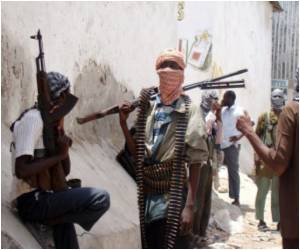
He knows a fateful call is probably minutes away.
"The days I would wait for Western tourists at Mogadishu airport are long gone," said the 51-year-old, propped against his beat-up Toyota minivan.
Three years of fighting between Islamist insurgents and pro-government forces have turned central Mogadishu into a death trap that kills and maims civilians almost daily.
"Now I pick up my clients from pools of blood in shattered homes. Needless to say they don't pay the fare," he said. His pay is three dollars a day, barely enough to feed him and his family.
Blood is now what ties Hassan to what is left of his native city, a place once known for its cafes, Italian architecture and pleasant tree-shaded avenues.
Advertisement
"It's not an ordinary job but I'm like everyone else in this city when I fear for my life every day," he said with resignation. "But there is nothing else to take in Mogadishu, so I figured this place needs people who help just for the sake of helping."
Advertisement
He flapped his hand at the agitated crowd in the nearby tea shop as he struggled to make out the crackly directions given by the panicked caller.
Within seconds, Hassan and his yellow and white striped ambulance hurtled through Mogadishu's ruined streets, siren blaring.
"This is how we work, you wait for a phone call. Most of the calls are about a mortar shell smashing into a populated area," he explained, tugging at the wheel to lift his speeding minibus out of a rut.
"Most of the time, I have a really tough time getting to the scene of the incident without getting killed myself," Hassan said.
Militia manning rogue checkpoints, artillery fire, trenches and cement boulders are just some of the obstacles he has to contend with.
"The roads are rough, sometimes they're blocked, so you need to know all the shortcuts. You have to keep in mind that you are not driving healthy passengers. Their survival depends on how clever you are," he said.
For Hassan, who has no medical training, the hardest part begins when he reaches the wounded and has to pick his way through body parts to identify who has a chance of surviving and needs his services the most.
"This is voluntary ambulance service. Can you imagine driving this vehicle and having to choose the most urgent cases without any medical assistance?"
"Sometimes people die in my van on the way to hospital and nobody will know the reason. They get their first treatment only when I reach the hospital," he explained.
Since Mogadishu sank into chaos following the 1991 ouster of president Mohamed Siad Barre, push-carts and wheel barrows had been the main medical emergency transport.
In 2008, Somali volunteers set up a voluntary ambulance service with the help of Mogadishu-based telecommunications company Nation Link.
There are six other drivers like Hassan in Mogadishu, ready to bring the wounded to the city's three main hospitals.
Ali Muse Sheikh Mohamoud, the head of Mogadishu ambulance services said his drivers brought more than 700 wounded to Medina in July alone but appealed for more help.
"We want to have medical staff onboard the ambulances in order to give more attention to the victims before they reach hospital," he said.
"But all this is done on a voluntary basis, there is not much more we can do. Yet fighting has become the norm, there are clashes every day," he said.
There are no reliable overall casualty figures for the fighting in Mogadishu but thousands die each year, caught in the crossfire of the never-ending battle for control of the capital.
Hassan moved his wife and eight children out of their home as the fighting got more intense in northern Mogadishu a few months ago; the last thing he wants is to be called to rush his own family to hospital.
The two previous drivers of his ambulance were killed doing their job.
At 51, Hassan has never heard of the Geneva conventions, which set standards in international law to limit the barbarity of war, but he knows he has already exceeded the average life expectancy of a Mogadishu male.
"For months now, this ambulance has been my home. Waiting for bad news is my life.
"I'm surprised every time I get a normal call that doesn't announce there's been bloodshed somewhere," he said, throwing his head back against his seat with a wry laugh.
Source-AFP







